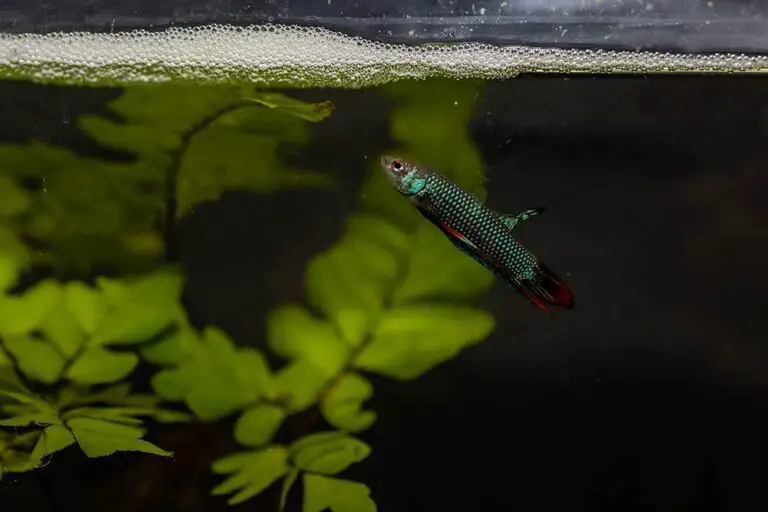Betta Fish Behavior Before Death (Signs your fish is dying)
It is a sad fact that all bettas die, and recognizing the signs of imminent death can help you provide your betta fish with the best possible care in its final days. This article explains betta fish behavior before death, with advice on how to make them comfortable before you say goodbye.
The most common behaviors a betta displays before death are lethargy, poor appetite, lack of interaction, and color fading. These signs may also be symptoms of illness, so it’s wise to seek advice from a qualified veterinarian, as treatment may save them.

This short article will discuss what to look for in terms of betta fish behavior before death. If you struggle to watch your betta fish dying, we can offer some coping tips. We will also provide advice to make the end-of-life process as smooth and peaceful as possible for your beloved pet fish.
How Long Do Betta Fish Live?
If you know how long your betta fish are likely to live, you will be better prepared for their inevitable death, so how long do betta fish live?
In captivity, betta fish will typically live for 3-5 years, although there are many reports of betta fish living for 8 or 9 years. Many factors affect the lifespan of betta fish, such as tank size, diet, and water conditions. Wild betta fish tend to live shorter lives due to fighting and aggression from other bettas in their natural habitat.
I have written a complete article that you can read here about the: betta fish lifespan, which discusses how long betta fish live, the main factors that influence their lifespan, and how to extend it.
Common Betta Fish Behaviors Before Death
Certain betta fish behaviors can appear quite bizarre as they are complex creatures. Some of these behaviors are perfectly natural, while others can signify that something is wrong.
The most common behavior changes you might see in a betta fish before death are:
- Lethargy
- Poor appetite
- Lack of interaction
- Color fading
- Hunched Back
- Slow reactions
Let’s briefly look at each of these individual behaviors.
Lethargy
Lethargy is a common betta fish behavior before death. If your betta suddenly stops moving around much, shows a lack of interest in everything, and is sleeping a lot, this is a sign that its body is slowly shutting down, and death may be near.
Lethargy is also a common symptom of many entirely treatable illnesses, so unless you have already treated a sick betta and it has not responded, or you feel that your betta is old and it’s their time to go, you should always seek professional advice.
Poor Appetite
Another common betta fish behavior before death is a loss of appetite. If your notice your Betta not eating, or only eating minimal amounts, this can signify that their time is coming to an end.
All biological functions begin to slow down at the end of life, and eating is not required or desired.
These signs are also common in people reaching the end of their life but are never definite unless you are aware of other factors such as age or, as mentioned above, an illness that has been treated and taken its toll. It would be best to continue to feed your betta as much food as you feel comfortable without creating too much waste in the tank.
Lack Of Interaction
If your betta fish is usually very interactive with you, other tank mates, or its general environment and suddenly becomes withdrawn, this could be a sign of illness or a common betta fish behavior before death.
Betta fish are social creatures and enjoy interacting with their surroundings, so a sudden lack of interest in anything other than hiding away can indicate something wrong.
I wrote an interesting article: Do Betta Fish Get Lonely Or Bored, which you may find of interest.
Color Fading
Color fading is not a betta fish behavior, it is instead a process that can happen quickly or slowly. As betta fish age, their color will naturally start to fade. This is a gradual process, however, if you notice that your betta’s color is fading very quickly or your betta has white patches on their body, this can be a sign of illness or old age.
Fading color can also be a sign of stress, so if you have recently moved your betta to a new tank, introduced new tank mates, or changed their diet, this could be the cause.

If you are concerned about your betta’s color fading, it is always best to consult with a professional as there could be an underlying health condition that needs to be treated.
Hunched Back
Is your betta is old, it will often develop a hunched back, and this is one way to tell if your betta is likely coming close to the end of its life. A hunched back is not a sign of them dying, it’s an indicator of old age, and it develops slowly, and over time.
If your betta does have a hunched back, it will progressively show other symptoms of aging, such as slow reactions and lethargy.
Slow Reactions
A betta that is sick or dying will often display much slower reactions than usual. The reason for slow reactions is the betta’s metabolism slowing down. A slowing metabolism is a natural part of aging, and it will also cause your betta fish to eat less and sleep more.
A bettas reactions can be tested using noise (by tapping on the betta tank glass), or you could see how quickly it responds at feeding time, especially if you don’t feed your betta for a day or two. A healthy betta will usually react quickly when food is put in the tank.
As you can see, there are many different behaviors that a betta fish might display before death. It is important to remember that not all of these behaviors are indicative of death, as some can be caused by stress or sick fish with treatable health conditions.
If you are concerned about your betta’s health, the best thing to do is consult with a professional who can help you determine if there is anything that you can do to help your fish. You can often avoid a betta fish death with the right advice.
Is My Betta Dying Of Old Age?
If your betta fish has been well looked after and escaped serious illness throughout its lifetime, old age will inevitably catch up with it sooner or later.
A betta fish dying of old age will often show signs of slowing down over time. Gradual color fading is a common sign of old age, and when accompanied by a general lack of interest, and excessive sleeping, your betta is likely near the end of its life.
It is not always easy to know how to tell if a betta fish is dying of old age, but they are often more susceptible to developing bacterial infections, as the body is less able to cope. If you can identify the cause of your sick betta fish or have taken professional advice, it is always wise to treat your betta fish even if you don’t feel they have long left.
Below is a useful video I found on Youtube that explains 10 symptoms or behaviors that you may notice when your betta is dying.
Betta Fish Head Down Tail Up – Are They Dying?
Like all other fish, betta fish can suddenly develop worrying symptoms, which are often attributed to a dying fish, when in fact, the fish is just sick and will recover if given the proper treatment.
One such symptom is when a betta fish swims with its head down and tail up. While this may look like a very bad sign and may appear that your fish will die, it can also mean that the betta is suffering from Swim Bladder Disease.
This disease affects the swim bladder, a buoyancy organ that helps fish swim straight, ascend, descend, or remain completely still in the water. If the swim bladder malfunctions, it is termed swim bladder disease, and your fish will lose all control of its essential swimming functions.
Swim bladder disease is not actually a disease, but instead, a symptom of another underlying condition, often caused by something as simple as a constipated betta fish, due to a blockage that is pressing against the swim bladder, compromising its ability to inflate or deflate. A bloated betta belly caused by a poor diet can also obstruct the swim bladder.
Fish that are dying can also suffer from swim bladder disease, but if your betta is displaying other symptoms of illness, then it is more likely that the cause is something else.
If your betta fish is swimming awkwardly or floating with its head down and tail up, and you want more information about swim bladder disorder, you can read my article: Betta Swim Bladder Disease – (A complete treatment guide).
Betta Fish Not Moving – Are They Dying?
Betta fish can be quite peculiar to watch, with many bizarre behaviors, such as their sleeping habits.
If your betta fish is not moving, it can be worrying as they may appear dead when they are just sleeping soundly. Betta fish can be found lying flat at the bottom of the tank completely still or may sit on a leaf or other flat object to sleep.

Betta fish can also breathe out of the water and are often seen jumping onto a leaf floating on top of the water, where they will take a nap. If you have ever wondered how long can fish live out of water, betta’s can manage it for several hours if they are kept moist.
Betta fish are one of the few species that can survive out of water due to a labyrinth organ which I will discuss in the next section.
When a betta fish sleeps, it can mimic the signs of death, which include color fading. Other fish are less likely to bother a dead fish as they don’t want to risk catching a disease from an infected fish that could kill them as well.
Usually, your betta changes from not moving at all to swimming around like a regular healthy betta in only a few moments.
My Betta Fish Died And Came Back To Life (Can This Happen?)
As mentioned above, betta fish can appear dead, especially when sound asleep, so if you feel that your betta fish has died and come back to life quite suddenly, they are likely only sleeping.
Another possibility is that the dissolved oxygen levels in the tank are far too low, and your betta fish has succumbed to drowning, but if you lift them out of the tank, where have access to the oxygen in the air, it can revive them.
As mentioned above, betta fish are one of only a few species of fish that can breathe out of the water through a labyrinth organ that acts as a lung, allowing the betta to survive in shallow water and in oxygen-deficient environments, so if you find your betta fish swimming at the top of the tank more often than usual, it may be an indication that oxygen levels are low.
If this is the case, you should check your tank’s oxygen levels immediately and find a method to oxygenate your tank if levels are low.
How To Comfort A Dying Betta Fish
Although it is difficult to watch a sick betta fish suffer, sometimes there is nothing more that you can do to save them.
In these cases, you can best provide proper care by making your betta as comfortable as possible for their final moments.
You can do this by ensuring the water temperature is warm, as they tend to feel colder when they are sick or dying, and by adding a little bit of salt to the tank, which will help ease any swelling or discomfort.
It is also essential to know how to clean a betta fish tank, as poor water quality and a dirty environment only add to your betta’s stress levels. Learning how often to change betta water and understanding what is the best water to use provides them with all of the oxygen and nutrients they need to remain comfortable.
If your betta is in a small tank, try and provide a bigger tank while it is dying. A larger tank with ornaments and plants is much less stressful to a betta fish.

Once your beloved betta has passed away, you can remove them from the tank, bury them in your garden, or flush them down the toilet.
Some people like to keep their betta fish in a jar on their mantle as a way to remember them.
If you have young children, they will probably get distraught by your betta fish’s death, so this is a perfect opportunity to teach them about death. You could make a little box from cardboard and have a proper send-off to celebrate their life.
How To Euthanize A Betta Fish
If you are confident that your betta fish is dying and you are finding it difficult watching them suffer, you could always consider euthanizing your betta fish which will end its suffering quickly and peacefully.
I won’t cover the subject of euthanization in-depth as it’s better left for the article I have linked to below, but I will mention a few effective ways to help your betta fish die easily and painlessly.
The most common method to euthanize a betta fish is to add a few drops of clove oil to the tank, which quickly puts your betta to sleep. Another way is to place your betta in a cup of cold water, which causes hypothermia putting them into a deep sleep or state of hibernation.
Once your betta is asleep, you can add ice to the water to make it even colder. Your betta’s organs will shut down as they gently fade away.
Read my article: How To Euthanize A Betta Fish (Humanely & Painlessly) to find out more.
Final Thoughts
Although it is never easy to lose a pet, understanding betta fish behavior before death can help you prepare mentally and emotionally for when the time comes, it can also help you decide whether to euthanize your betta fish if their suffering becomes too great.
Euthanasia is often the kindest option for a dying betta fish as it allows them to die peacefully without prolonged pain and suffering.
I hope this article has helped you out and provided you with the information necessary to comfort your betta in its final hours.







